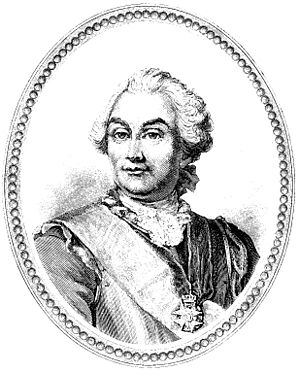Axel von Fersen the Elder facts for kids
Count Fredrik Axel von Fersen (born April 5, 1719 – died April 24, 1794) was an important Swedish politician and soldier. He came from a family with Baltic German roots. He served as the Lord Marshal of the Riksdag of the Estates, which was like the Swedish parliament. Even though he worked closely with King Gustav III during a big change in 1772, he later became one of the king's opponents.
Contents
Who Was Fredrik Axel von Fersen?
Fredrik Axel von Fersen was the son of Lieutenant-General Hans Reinhold von Fersen. He joined the Swedish Life Guards in 1740. From 1743 to 1748, he served in the French army. There, he became a brigadier, which is a high military rank. His brother was Count Carl von Fersen.
Fersen's Military Career
During the Seven Years' War, Fersen showed great skill as a soldier. In 1759, he fought well around Usedom and Wollin. He caused significant losses to the Prussian army.
Fersen's Political Life
Fredrik Axel von Fersen is most famous for his political work. He was a member of the "Hat party," one of the main political groups in Sweden at the time.
At the Riksdag (parliament) in 1755–1756, he was chosen as the Lord Marshal. This was a very important leadership role in the parliament. He held this position three times before the "Revolution of 1772."
In 1756, he stopped the king's plans to gain more power. However, after Sweden faced difficulties in the Seven Years' War, Fersen became more supportive of the royal court.
The Caps and Hats Parties
In 1766, another political group, the "Caps," came to power. King Adolf Frederick of Sweden was very frustrated by their demands. He even gave up his throne for a week. Fersen refused to use the army to control the situation in the capital city.
At the next Riksdag in 1769, the "Hats" party returned to power. Fersen was again elected Lord Marshal. He had promised Crown Prince Gustavus (who later became King Gustav III) that he would help reform the government. However, he did not follow through. This unintentionally helped the king gain more absolute power later on.
Fersen and King Gustav III
When Gustav III became king in 1772, he tried to bring the two political groups together. He wanted to share power between them. Fersen felt it would be hard to make people more virtuous after many years of corruption. Still, he agreed to talk with the "Caps" party. He was the main representative for the "Hats" party in these talks.
During the "Revolution of August 1772," which changed the government, Fersen did not act. He watched as the old system was overthrown. He was one of the first people Gustav III called to his side after the king's success.
For several years, Fersen opposed King Gustav III's plans. Some say he treated the king with great disrespect. In 1778, they had a small disagreement. But at the Riksdag in 1786, Fersen led the opposition against the king's money plans. As a result, the king's plans were rejected.
In 1789, Fersen and twenty of his friends were arrested. This caused the opposition to fall apart. However, Fersen was quickly released. After that, he stayed away from politics.
Fersen's Writings and Wealth
Fredrik Axel von Fersen wrote a book called Historiska Skrifter. This book is mostly about his own life. However, his historical accounts in the book are sometimes biased, meaning they favor his own views.
Fersen was one of the wealthiest people in Sweden. He owned four large houses: Löfstad, Steninge, Ljung, and Mälsåker. He also owned mines, land, forests, and iron foundries in Sweden and Finland. He had a large share in Sweden's East India Company, which was a very profitable business.
Fersen's Family
Fredrik Axel von Fersen had four children with his wife, Hedvig Catharina De la Gardie. His most famous children were Axel von Fersen the Younger and Sophie von Fersen. His other children were Fabian Reinhold von Fersen and Hedvig Eleonora von Fersen.
 | Janet Taylor Pickett |
 | Synthia Saint James |
 | Howardena Pindell |
 | Faith Ringgold |


